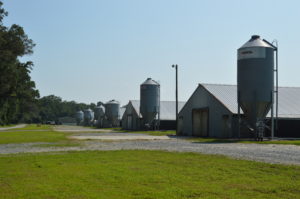
During Senate Hearing Today, Maryland Environmental Secretary Promises to Hire Additional Inspectors for Poultry Operations
Annapolis – Facing criticism for failing to enforce frequent poultry industry violations, Maryland’s Environmental Secretary said during a hearing of the state Senate today that his agency would boost inspections by half and hire two additional inspectors.
“I am committed to increase the number of inspections we do by 50 percent over the next year,” Environmental Secretary Ben Grumbles told the senate Education, Health and Environmental Affairs Committee.
Grumbles faced questions from the committee about an Environmental Integrity Project report on Oct. 29 titled “Blind Eye to Big Chicken.” That report found that inspections of poultry operations had fallen by 40 percent since 2013, and that 84 percent of 182 Eastern Shore poultry operations that were inspected by the Maryland Department of the Environment (MDE) from 2017 to 2020 failed one or more pollution control permit requirements. Only 2 percent were fined by the state.
In response to criticism generated by that report, Grumbles yesterday said that MDE would hire more inspectors to ensure environmental compliance from the state’s more than 500 poultry operations, increasing the number of poultry inspectors from the current three to five.
Grumbles also said that MDE will be committed to performing “200 to 300” inspections of poultry facilities a year. That would be a significant increase from the 150 poultry operations inspected a year over the last five years, according to MDE data cited in the Environmental Integrity Project (EIP) report.
“This is good news for the Chesapeake Bay that MDE will be increasing its inspection staff and has pledged to significantly boost its inspections of the poultry industry,” said Eric Schaeffer, Executive Director of the Environmental Integrity Project and former Director of Civil Enforcement at EPA, who testified during today’s hearing. “However, more needs to be done – including more routine penalties for chronic violations of pollution control laws to protect waterways and public health.”
Grumbles added that “video inspections” would be an important new part of MDE’s enhanced oversight of the poultry industry, drawing sharp questions from state Senator Cheryl Kagan, a Democrat from Montgomery County and Vice Chair of the committee.
“Video inspections are a little bit terrifying… folks will show what they want to show,” Kagan said of farms being inspected by MDE during ZOOM-like videoconference meetings. “How can people have any confidence in this?”
Grumbles responded that MDE’s video inspections would not replace in-person inspections, but be a “valuable additional tool” to allow more oversight of poultry farms, especially at a time of heightened concerns about spread of viruses from in-person visits.
During the hearing, Senator Paul Pinsky, the chairman of the committee, and other senators also grilled Grumbles about MDE’s slow response to pollution violations by a Valley Protein meat processing plant east of Cambridge on the Eastern Shore and recent sewage spill in southern Maryland that made people sick who ate oysters from the contaminated waters. Pinsky published an Op Ed in The Baltimore Sun today blasting MDE’s poor performance protecting the public. “Maryland’s environmental horror show,” was the headline.
“I take responsibility,” for MDE’s poor communication about the southern Maryland sewage spill, Grumbles told the committee.
Addressing the water pollution violations at the Valley Protein meat processing plant, Grumbles pledged to take “strong enforcement action.” “We are focused on the enforcement action that we are taking against Valley Protein…and we are also focused on modernizing the permit.”
EIP’s report, “Blind Eye to Big Chicken,” was discussed by the committee. The report examined more than 5,000 pages of MDE records to document how Maryland’s program to limit water pollution from poultry operations is riddled with gaps that make it nearly impossible to hold the industry accountable for pollution.
The report found that the number of poultry farms inspected by MDE on an annual basis has fallen by 40 percent since 2013, even as the number of permitted operations has grown slightly, according to state records. MDE inspected an average of 218 operations a year from 2013 through 2017, but only 134 per year from 2018 through 2020, with the decline predating the COVID-19 pandemic.
More than two-thirds of poultry operations were not inspected at all between 2017 and 2020, state records show.
MDE Secretary Grumbles said today that increased staffing and inspections would help address that problem.
The Environmental Integrity Project is a 19-year-old nonprofit organization, based in Washington D.C., dedicated to enforcing environmental laws and strengthening policy to protect public health and the environment.
Media contact: Tom Pelton, Environmental Integrity Project, (443) 510-2574


